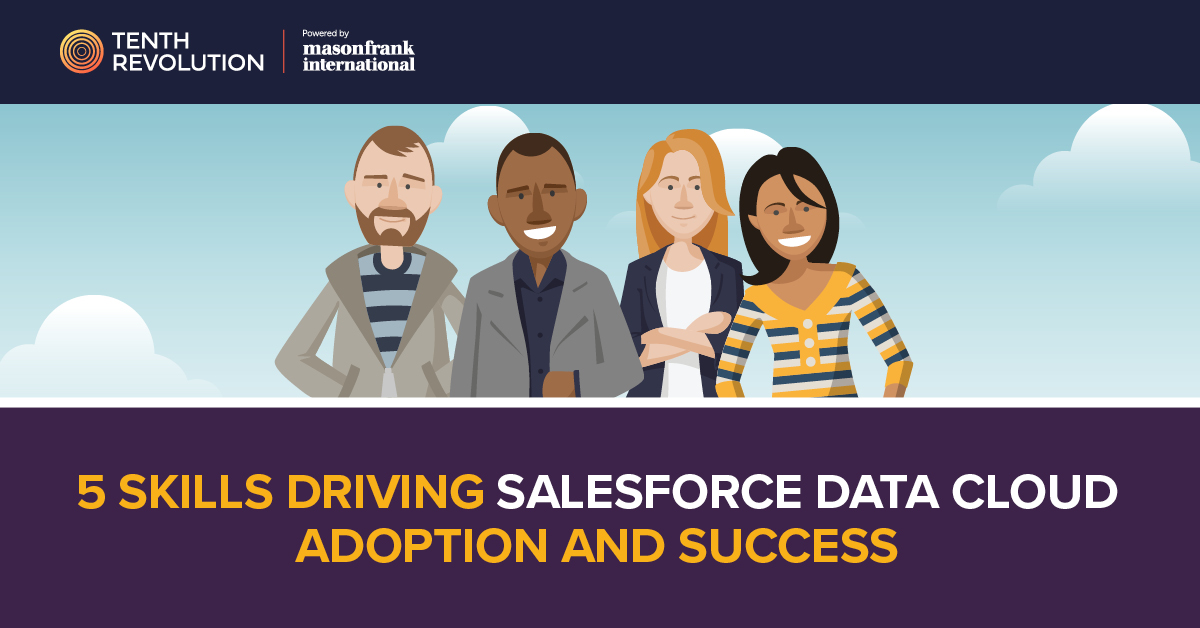
Salesforce Data Cloud is helping businesses unlock real-time customer insights across every touchpoint, but success depends on having teams who understand how to use it strategically.
For many enterprises, the challenge has never been data collection. It has been connecting all that information in a way that provides consistent, actionable intelligence without creating complexity or compliance risk. Salesforce Data Cloud, a customer data platform (CDP) built directly into the Salesforce ecosystem, helps organizations unify customer profiles and connect to enterprise data lakes through zero- or low-copy architecture.
This means businesses can activate insights in real time without moving or duplicating large datasets, enabling faster personalization, better decision-making, and stronger governance. But like any advanced Salesforce solution, the technology delivers value only when the right people are in place to manage, integrate, and scale it effectively.
1. Data architecture and integration strategy
Data Cloud connects Salesforce with other enterprise systems through APIs and native connectors. That requires professionals who can design and maintain integration patterns that keep data accurate and synchronized.
These specialists understand how to structure pipelines between Salesforce, marketing systems, and external data sources, such as data warehouses or lakes hosted on platforms like AWS or Azure. They ensure each source feeds into the unified customer profile without introducing duplication or latency.
For executives, the key is to hire Salesforce experts who can balance innovation with governance. A skilled integration architect can help a business activate insights while ensuring compliance and data lineage remain intact.
The technology is powerful, but success still depends on people. Mason Frank connects you with Salesforce professionals who can design and manage modern data integrations that support both agility and control.
2. Data modeling and identity resolution
One of Data Cloud’s strengths is its ability to create a single customer view by matching and merging records across multiple systems. To achieve this, teams need data modelers who understand how to define relationships between customer attributes, transactions, and engagement history.
These professionals also manage identity resolution, matching customer records accurately across channels and systems. This skill is crucial for marketing and service teams that rely on precise, privacy-compliant data to personalize customer experiences.
Without careful modeling and deduplication, the promise of real-time insights can quickly collapse under inconsistent or fragmented data.
3. Real-time analytics and activation
Data Cloud’s real-time capabilities allow businesses to segment customers, trigger campaigns, and personalize interactions as events happen. But turning those features into business value requires data analysts and marketing technologists who can interpret insights and act on them quickly.
They need to understand how to define key metrics, create activation rules, and integrate with Salesforce Marketing Cloud or external platforms for omnichannel engagement. In many organizations, these roles sit at the intersection of data science, marketing strategy, and automation engineering.
By hiring professionals who understand both analytics and activation, leaders can ensure Data Cloud becomes a driver of measurable growth rather than a passive data repository.
4. AI readiness and governance
As Salesforce continues to embed artificial intelligence across its ecosystem through Einstein and Copilot, the quality and structure of data feeding those models will determine their accuracy. Teams managing Data Cloud play a central role in preparing this data for AI workloads.
Professionals with AI governance and model-readiness experience can help ensure the right controls are in place to make data usable for predictive analytics while maintaining compliance with privacy regulations like GDPR or CCPA.
Organizations that fail to connect data governance with AI strategy risk creating models that deliver inconsistent or biased results. The right Salesforce professionals can prevent that by aligning data architecture with business and ethical frameworks.
Mason Frank helps businesses find Salesforce experts who understand how data quality and compliance shape AI outcomes, supporting safer and smarter adoption.
5. Change management and stakeholder alignment
The most successful Data Cloud projects are not driven solely by technology. They rely on teams that can align business stakeholders, communicate the value of unified data, and manage change across departments.
Change leaders and Salesforce project managers help define a shared vision for how Data Cloud supports marketing, service, and analytics goals. They translate technical capabilities into business benefits that resonate with C-suite priorities.
For enterprises investing in Data Cloud, these people are essential. They ensure adoption goes beyond configuration and becomes embedded in how the organization makes decisions and engages with customers.
Building the human foundation of a Data Cloud-first strategy
Salesforce Data Cloud represents a new standard in connected customer intelligence. It brings together real-time data, scalable integrations, and embedded AI readiness in one trusted environment. But the technology’s full impact depends on the human expertise guiding its implementation.
By building teams with the right mix of architecture, analytics, governance, and leadership skills, organizations can accelerate their data maturity and drive real competitive advantage.
The future of customer experience will belong to businesses that treat data as a team sport and invest in the people who can make it work.


